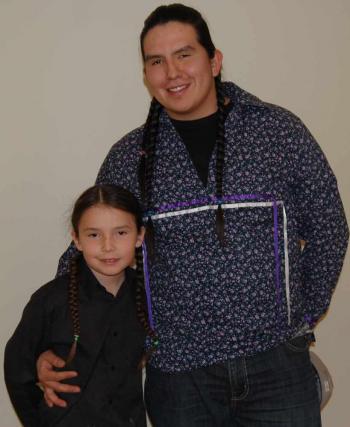Image Caption
By Shari Narine
Windspeaker Contributor
EDMONTON
“I really didn’t feel that good. I had, like, a bad feeling,” said Royce Makokis. That’s how the seven-year-old felt when he was recently told to leave the men’s washroom at a Superstore.
Why? Because he had braids.
When he told his dad Jay Roy Makokis what happened, Makokis and Royce tried to find the older man who had ordered Royce to leave. But the man was gone.
It was unacceptable what the man did, says Makokis.
“My boy was sad. I’ve never seen that look on his face before,” he said. “That broke my heart to see him like that.”
But Royce is standing strong. He is proud of his braids – which he started growing four years ago when his dad started growing his braids – and says he has no plans to cut them.
Royce accompanied his father to a noon-hour panel discussion called “Boys with Braids,” hosted by the Native Studies Course Requirement Group at the University of Alberta on April 10.
Makokis recounted the incident on Facebook and was moved to write a poem he titled “Image of Himself:”
Look at my hair and notice the length
It’s who I am. It gives me strength.
I don’t care if it’s not the norm.
Look at me in my natural form.
I was made like this from the one above
No one can ever cut these strands of love.
Let’s just say the world loses all light.
Creator would find me with my braids on tight.
Don’t worry, son, it will be okay.
Let’s be thankful for another day.
Take care of your hair, son, you’ll have good health
Just remember Creator made us in the image of Himself.
Makokis says he started growing his braids when he “started becoming cultural.” And like many little boys, Royce willingly and proudly followed in his father’s footsteps.
Makokis says his adopted father, who is his mentor in both ceremony and life, told him that the braids were “like our wings. That’s what we’re going to need to fly to the happy hunting grounds.”
Makokis says he will continue to encourage his son to show pride in his heritage.
“If I had that as a kid, learned this as a kid, I think I’d be farther … It took me up to now to be comfortable in my own skin,” said Makokis.
Tyson Frencheater and Kiran Auger both spoke about their challenges of growing braids.
Frencheater started growing his hair when he was 10. While he has kept his braids, he says there were times when he hid them under his shirt. Too often he was mocked when he was growing up, told he looked like a girl with his braids.
For Auger, his hair was “really long” until he was eight or nine. That was when his parents “found Jesus” and cut his braids. Now, he is growing his hair out again, but still, even though he is a university student, he fights with his parents about his decision.
Both Auger and Frencheater say they are proud about their decision to grow their hair and want to stand as role models to the younger generation.
“I encourage everybody to grow their hair. Be proud of that and wear your braids out proud,” said Frencheater.
Alexander First Nation Elder Terry Newborn says when he was 18 years old he started braiding his hair in response to the teachings of his Elders. They told him the braids represented sweetgrass and connected him to the road he travelled, which had no drugs or alcohol and “was a real strict road. And if you go on that road you need to be honest, kind, caring, sharing, and loving.”
Newborn, who no longer has long hair, says it upsets him to see young men today with braids, who are also drinking or using drugs.
“That kind of hurts me because I know the importance of braids. It’s connected to our culture and braids represented sweetgrass,” he said.

